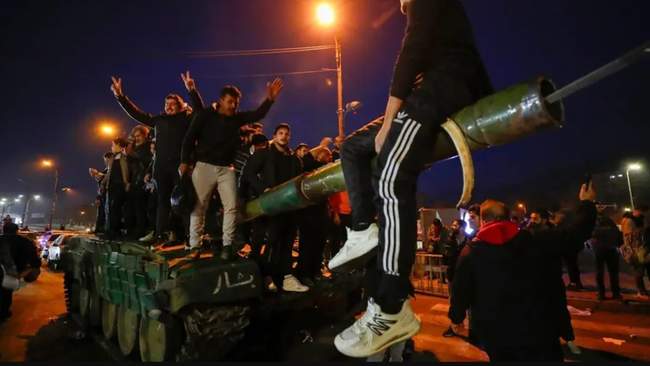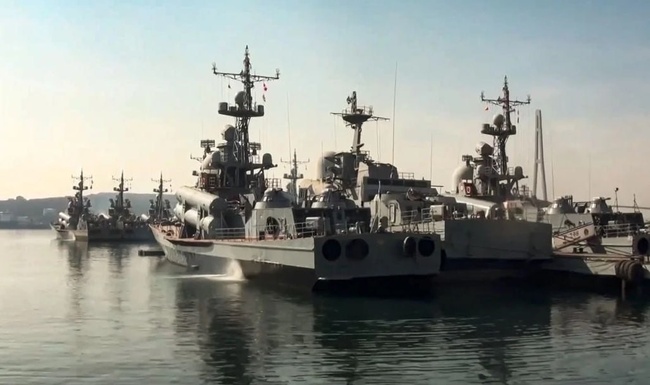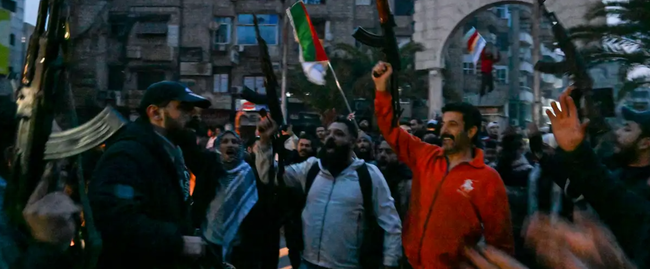Меню
Соціальні мережі
Розділи
Dec. 8, 2024, 10:08 p.m.
Fall of the Assad regime: will it affect the course of the war in Ukraine?
This article also available in English452

Photo: AP Photo/Omar Sanadiki
Tensions are rising in the world. Russia's aggression in Ukraine and Israel's military actions provoked by Hezbollah militants have recently been joined by rebel actions against the Bashar al-Assad regime in Syria, protests by opposition forces in Georgia, and the political crisis in South Korea. Naturally, Ukrainians view all these events in terms of a full-scale invasion of our country.
A sudden offensive
In the last week of November, in response to Russian and Syrian air strikes on rebel-held areas, the latter launched an offensive in the northwestern province of Aleppo. This offensive was supported by Turkey. The attacks killed at least 27 civilians. Syrian rebels, led by the Islamist group Hayat Tahrir al-Sham, conducted a surprise operation in government-controlled cities and, almost a decade after they were pushed out by forces close to President Bashar al-Assad, found themselves in Aleppo for the first time since 2016. The offensive began on Wednesday, November 27, and by the evening of November 29, they had already captured several districts of the city. Experts agreed that the offensive became possible due to the weakening of Iranian-backed forces in the region as a result of Israeli strikes.
The confrontation lasted until almost December 7, when, after the rebels advanced toward the capital, Bashar al-Assad took off from Damascus by plane. The Hayat Tahrir al-Sham group claims to have shot down an IL-76, which was probably carrying the president. However, there is no official confirmation of the information. MP Oleksiy Honcharenko claims that a Syrian airplane landed in Budapest last night.

Dictators Assad and Putin. Photo: Reuters
"There are reasons to suspect that Bashar al-Assad could have been on the plane. Or someone close to him. The arrival of the flight was accompanied by high security measures. We signed non-disclosure documents with some airport employees," he wrote, citing his sources.
Meanwhile, journalist Barak Ravid reported that Assad left Damascus around midnight and headed to a Russian military base in Syria to fly to Moscow. The head of the Syrian opposition abroad, Hadi al-Bahra, confirmed that Damascus is now without Bashar al-Assad.
Russia's latest actions in Syria
As a result of the rebels' advance, experts said that Russia will be forced to increase its military presence in Syria, but without using the troops involved in Ukraine. This opinion was expressed by Oleksandr Sushko, Executive Director of the International Renaissance Foundation, on Espresso TV. He explained that in order to strengthen support for the Assad regime, the Russians have additional resources that are not involved in the war with Ukraine. It should also be taken into account that analysts at the Institute for the Study of War (ISW) reported that Russia had to withdraw S-300 systems and its troops from Syria, probably to be used in the war against Ukraine.
Therefore, Russia tried to enlist the help of other states to support the Assad regime. On November 30, Russian Foreign Minister Sergei Lavrov had a conversation with Turkish Foreign Minister. The parties discussed the need to coordinate joint actions within the framework of the Syrian peace process launched by Russia, Turkey and Iran in December 2016.
On the same day, Lavrov spoke by phone with Iranian Foreign Minister Abbas Araghchi. The diplomats agreed to step up joint efforts to stabilize the situation in Syria. Iraqi and Syrian sources reported that some Iraqi troops entered Syria in early December to support Assad. It was noted that the forces of the Iraqi paramilitary coalition Hashd al-Shaabi were concentrated along the border with Syria, saying that it was a purely preventive action in case the fighting spread to Iraq.
At the time, at least five ships left the Russian naval base in Tartus. According to several OSINT analysts, given the success of the rebel forces in Syria, the Russian military command probably had concerns about the real danger to the fleet stationed at the Russian naval base in Tartus, Syria.

Photo: Associated Press
Therefore, the Russians took several of their ships to sea, as evidenced by satellite images. It is noted that among the withdrawn ships:
- two multi-purpose frigates "Admiral Gorshkov" and "Admiral Golovko";
- patrol ship "Admiral Grigorovich"
- sea tanker "Vyazma";
- medium sea tanker Yelnya.
Analysts claim that the Russian submarine Novorossiysk is also stationed in Tartus, but it is not yet known whether this vessel has left the base. In their opinion, the Russian naval base is under threat due to the successful offensive of the rebels fighting against the Bashar al-Assad regime. They are sure that the Russian command is aware of the danger, so they are taking precautions and putting the ships to sea. It is noted that it is easier for Russia to leave the base when the front line is approaching it, because it is too difficult to transfer reinforcements to Tartus.
The naval base in Tartus on the Mediterranean coast of Syria is a strategic asset for Russia. It was created during the Soviet era in 1971, but after its collapse it was not used for almost two decades. When the civil war in Syria broke out in 2012, Russia brought its fleet back there. And with the start of the full-scale invasion of Ukraine in 2022, the Tartus base became even more important. It was reported that Russia had increased its military presence there before the invasion to counter and deter direct NATO intervention, especially aircraft carriers in the Mediterranean. At the same time, Russia also deployed several large warships there to take part in the war against Ukraine. However, these plans were thwarted by Turkey, which blocked the passage of Russian warships into the Black Sea under the Convention.
The fall of the Assad regime in Syria
In the morning of December 8, the opposition released its first statement to Syrians via state television: "The city of Damascus has been liberated, the tyrant Bashar al-Assad has been overthrown. All prisoners have been released from Damascus prison. We wish all our fighters and citizens to preserve and maintain the property of the Syrian state. Long live Syria".
Reuters released a report allegedly from representatives of the Syrian army, which is fighting on the side of Assad, that it allegedly continues military operations against the rebels in the cities of Hama and Homs, as well as in the rural area of Deraa. But the Syrian Prime Minister Mohammed Ghazi Jalili said that the government is ready to "extend a hand" to the opposition and transfer its functions to the transitional government.
"I am in my house and I have not left anywhere, and this is because I belong to this country," he said in a video message. However, he did not say anything about Bashar al-Assad's whereabouts.
Why the rebels have intensified
The aggravation in Syria has occurred right now because the team of President-elect Donald Trump will soon come to power in the United States. This opinion was expressed on Espresso by Israeli political scientist, IDF reserve lieutenant colonel Ariye Zayden.
He stated that the ethnic groups in power in Syria used to make up 15-20% of the total population. They included Bashar al-Assad and his entire family.
"And now they are closer to the Shiites than to the Sunnis, and those who are attacking are Sunnis, and they belong to the religious wing of the fundamentalist, Sunni, wing. And that's what they're fighting over there," Seiden said.
Officially, the Turkish government has denied any involvement in the sudden rebel attack on Aleppo last week. Any sustained rebel gains could allow the return of many Syrian refugees currently living in Turkey, a major goal for Ankara.

Photo: Louai Beshara/AFP
How events in Syria can lead to war in Ukraine
Unexpected rebel attacks in Syria may well have diverted some of Russia's attention from its war in Ukraine. But the Assad regime fell so quickly that the aggressor country did not have to withdraw its troops from Ukraine to support the Syrian government.
The Telegraph's military columnist David Axe suggested that the loss of the Tartus naval base could force the Kremlin to make a difficult choice. Such a situation may prompt Moscow to restore access to the Mediterranean Sea through the Bosphorus, which means ending the war in Ukraine. According to the agreement signed by Russia and Syria in 2017 for a period of 49 years, Moscow gained even wider access to Tartus, which has become an extremely important naval base. Lacking modern, reliable ships capable of withstanding long sea voyages, Russia is forced to rely on "coastal navigation" of its fleet from port to port.
"The loss of Tartus would be catastrophic for the projection of Russian power in Southern Europe and North Africa. Realistically, the only way for the Kremlin to replace the vital coastal infrastructure in Tartus is to restore access to the Mediterranean Sea through the Bosphorus, which is closed to the Russian fleet because of the war in Ukraine," the observer notes.
Thus, the loss of the base in Tartus may force the Kremlin to choose between continuing to fight in Ukraine and losing influence in the Mediterranean region, or making peace with Ukraine and unblocking the Turkish straits for its fleet.
Dictator Putin has received a painful political blow because of the Assad regime's defeat in Syria, in particular because it may affect his ability to influence the price of oil in the world.
This opinion was expressed by political expert Taras Zagorodny in a commentary to RBC-Ukraine. He said that the defeat of the Assad regime allows for a gas pipeline to be built through Saudi Arabia, Jordan and Turkey to Europe. This will allow European countries to no longer depend on supplies from Russia. In addition, Russia will lose its only military base on the Mediterranean Sea in Tartus, which has been there since the Soviet era. "And a personal option - Putin fought for Assad to show everyone that you can't change leaders," the expert believes.
The political analyst believes that Russia will lose influence in the Middle East after the Assad regime loses in Syria. He said that Russia does not want to lose its positions in Syria, but it does not have the strength to stay there. "That's why they have problems with Georgia, problems in Syria, and Ukraine. There are actually a lot of "black swans," but not enough resources to keep them," the expert added.
On December 8, Syria's Prime Minister told Al Arabiya TV that the new government will decide on the issue of Russia's military presence in the republic.
Also, US President-elect Donald Trump said on his social platform Truth Social that Assad "fled his country" from Syria after losing Russia's support. "Assad is gone," he wrote. - "His protector, Russia, led by Vladimir Putin, was no longer interested in protecting him."









